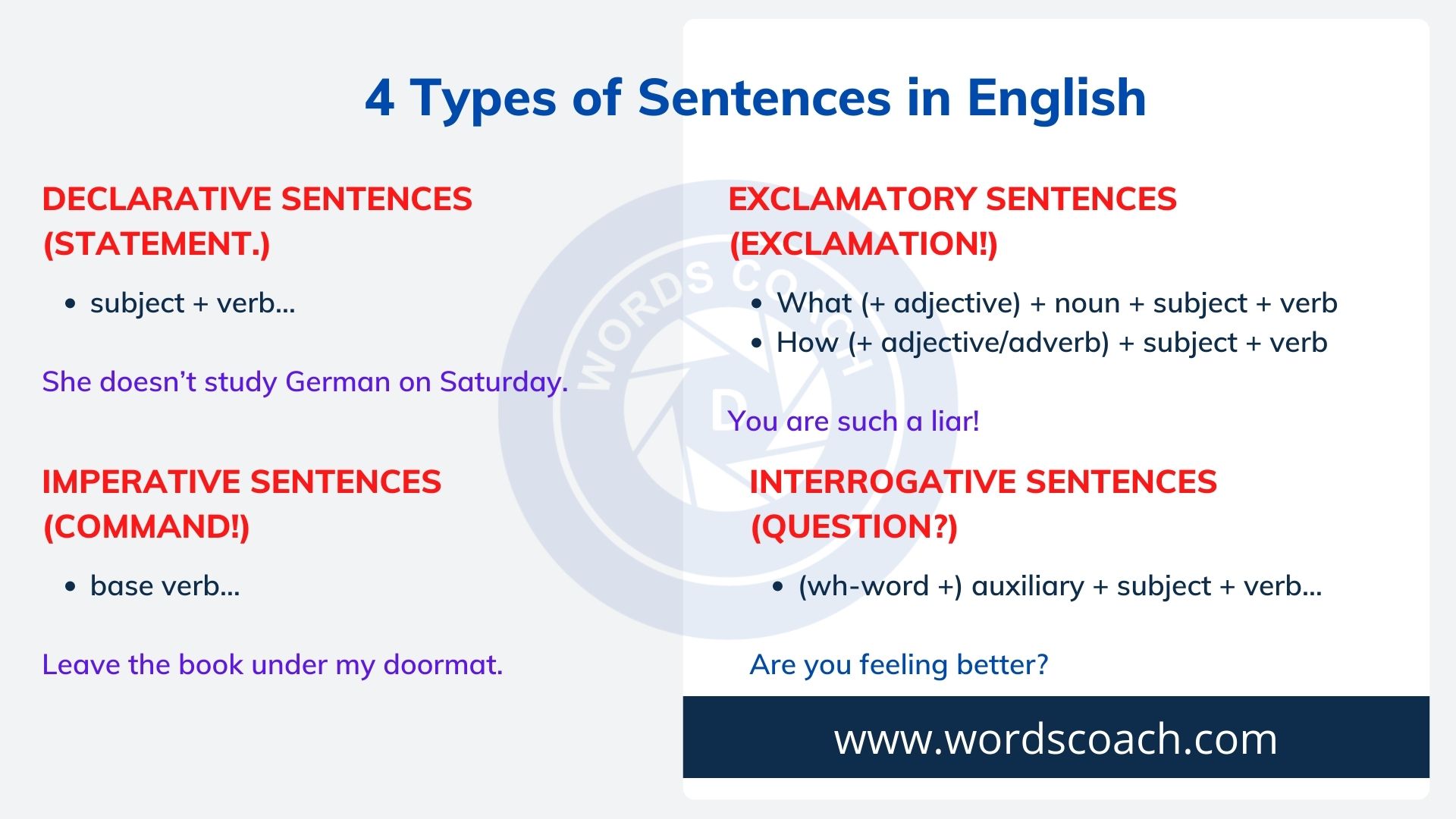Types of Sentences in English
The building blocks of communication, sentences are the foundation of expressing ourselves clearly and effectively. But did you know there’s more to sentences than just stringing words together? In the fascinating world of English grammar, sentences come in various types, each serving a distinct purpose.
Whether you’re a student mastering the fundamentals or a writer seeking to elevate your craft, understanding these different sentence types is essential. This guide will unveil the secrets of declarative, interrogative, imperative, and exclamatory sentences, equipping you to construct powerful and purposeful sentences in your writing and speech.
There are four types of English sentences, classified by their purpose:
1. Declarative Sentences (statement.)
2. Exclamatory Sentences (exclamation!)
3. Imperative Sentences (command!)
4. Interrogative Sentences (question?)
1. Declarative Sentences (statement.)
The declarative sentence that makes a statement, provides a fact, offers an explanation, or conveys information. They tell us something. They give us information, and they normally end with a full-stop/period.
Declarative sentences can be positive or negative.
The usual word order for the declarative sentence is:
subject + verb…
Examples:
- She doesn’t study German on Saturday.
- We watched TV last night.
- We did not watch TV last night.
- I do not like coffee.
- George brushes her teeth twice a day.
2. Exclamatory Sentences (exclamation!)
Exclamative sentences express strong emotion/surprise an exclamation and they always end with an exclamation mark/point (!).
The usual word order for the exclamative sentence is:
What (+ adjective) + noun + subject + verb
How (+ adjective/adverb) + subject + verb
Examples:
- You are such a liar!
- What an exciting movie it was!
- He is such a kind person!
- How he lied!
- But don’t forget what I said!
3. Imperative Sentences (command!)
Imperative sentences give a command. They tell us to do something, and they end with a full-stop/period (.) or exclamation mark/point(!).
The usual word order for the imperative sentence is:
base verb…
Note:- that there is usually no subject—because the subject is understood, it is YOU.
Imperative sentences can be positive or negative.
Examples:
- Leave the book under my doormat.
- Don’t give her coffee.
- Play with intensity and courage.
- Turn left at that intersection.
- Please open with care.
4. Interrogative Sentences (question?)
Interrogative sentences ask a question. They ask us something. They want information, and they always end with a question mark.
The usual word order for the interrogative sentence is:
(wh-word +) auxiliary + subject + verb…
There are three basic question types and they are all interrogative sentences:
- Yes/No question: the answer is “yes or no”, for example:
Do you want dinner? (No thank you.) - Question-word (WH) question: the answer is “information”, for example:
Where do you live? (In Paris.) - Choice question: the answer is “in the question”, for example:
Do you want tea or coffee? (Tea please.)
Examples:
- Are you feeling better?
- What do you believe?
- What sort of nation might you want to live in?
Read More about Interrogative Sentences: Click here.
So, the next time you put pen to paper or open your mouth to speak, remember the power of crafting the perfect sentence type! By mastering these versatile tools of communication, you can ensure your message is clear, impactful, and leaves a lasting impression on your audience.
Ready to explore the exciting world of sentence types? Dive deeper into this guide and unlock the secrets to effective communication!





